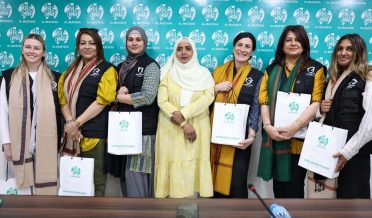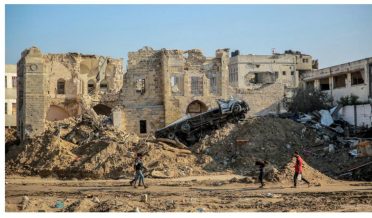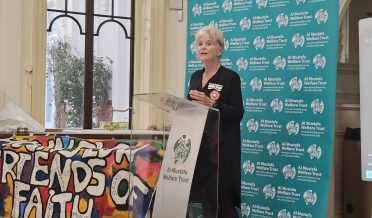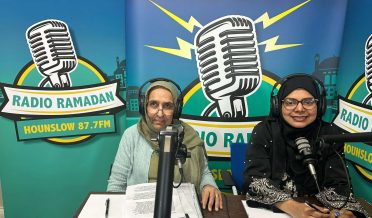Wajahat Ali Khan
Almustafa Welfare Trust” strongly beliefs that humanity helps us understand others through their problems, languages, history and their culture. We think the humanities teach empathy. We are witness about humanitarian crisis all over the world but Syria, Yemen and Lebanon are in the grip of the most insidious crisis, so at the moment we are spending most of our energies in this part of the Middle East. As, Yemen is one of the Arab world’s poorest countries, has been devastated by a civil war. Abdulrazzaq Sajid the chairman of AMWT has said that Here as a Charity we explaining what happening there which is causing human tragedy day by day. Because AMWT is an eyewitness to these events and doing the work of humanity on the ground, so we can loudly say that Yemen is one of the largest humanitarian crises in the world, with more than 24 million people – some 80 per cent of the population – in need of humanitarian assistance, including more than 12 million children. Since the conflict escalated in March 2015, the country has become a living hell for the country’s children. Now, with COVID-19 spreading, Yemen is facing an emergency within an emergency. Sanitation and clean water are in short supply. Only half of health facilities are functioning, and many that remain operational lack basic equipment like masks and gloves, let alone oxygen and other essential supplies to treat the coronavirus. Including “Almustafa welfare Trust” Many health workers are receiving no salaries or incentives. Children continue to be killed and maimed in the conflict, while the damage and closure of schools and hospitals has disrupted access to education and health services, leaving children even more vulnerable and robbing them of their futures.

Meanwhile, nearly 2.3 million children under the age of five in Yemen are projected to suffer from acute malnutrition in 2021, according to an analysis in February. Of these, 400,000 are expected to suffer from severe acute malnutrition and could die if they do not receive urgent treatment. A dangerous combination of factors, driven by conflict and economic decline and now exacerbated by COVID-19, have compounded the dire situation for Yemen’s youngest children. Mr Sajid said that, at Al Mustafa Welfare Trust, we are committed to doing all that we can to help and support these children, sending vital aid and supplies. With our donor’s generous support, we are reaching more families, children and vulnerable adults through our Yemen appeal, doing our bit to make the daily struggle for survival that little bit easier. Our teams are exclusively working with UN registered partners to provide essential aid. “Almustafa Welfare Trust” serving frequently at the Syria-Turkey border to the refuges as well. Now this crisis entering its 11th year, the Syrian refugee crisis remains the world’s largest refugee and displacement crisis of our time. … About 5.6 million Syrians are refugees, and another 6.1 million people are displaced within Syria. Nearly 11.1 million people in Syria need humanitarian assistance. Even after 11 years of conflict and dispute, Syrian refugee crisis still remains the largest refugee and displacement crisis in recent times. In all these years, families have suffered in brutal war that has killed hundreds of thousands of people, demolished a nation, and pushed the country back by decades. Today, about 5.6 million Syrians are living their lives as refugees, and another 6.1 million people are displaced within Syria. More than 11 million people in Syria need humanitarian assistance. And about half of the people affected by the Syrian refugee crisis are children. The violent nature of the conflict has caused severe damage to the already weak infrastructure of the country. Healthcare canters and hospitals, schools, utilities, and water and sanitation systems are damaged or destroyed. The ongoing conflict has especially taken a toll on young children & orphans who have lost their homes as well as their families. This is why Al Mustafa Welfare Trust is committed to not only provide material aid but also psychological support to these vulnerable children.

Al Mustafa Welfare Trust and our partners are providing relief aid to thousands of Syrian Refugees forced to live in makeshift camps. Additionally, our Syria funds are also used for crucial medical supplies to help treat sick and injured refugees. Abdulrazzaq Sajid has said that I went at both country’s border with a media team from UK twice and we witnessed the people’s helplessness. Our teams are exclusively working with UN registered partners to provide essential aid.
The chairman Abdulrazzaq Sajid said that AMWT also doing its relief effort in Lebanon because Lebanon has been suffering several crises for decades but last year explosion at the Beirut port is what may bring the country to a complete collapse. With hundreds of deaths and thousands injured, Lebanon’s dire health and humanitarian crises have escalated. The blast left 190 dead and more than 6500 injured. The country’s medical system – which has already been stretched due to the coronavirus pandemic. The current coronavirus pandemic as well as economic meltdown of the last months have forced the country into poverty as nearly half of the country’s population live below the poverty line and 35% are out of work, according to official statistics, our partners are currently on the ground and working hard to provide humanitarian aid such as vital food packs, hygiene kits, emergency relief packages & medical aid to those most in need.

The destruction from the explosion has been widespread, with about 40% of Beirut severely damaged, leaving around 300 000 residents with devastated dwellings. 3 According to WHO reports, impacts on health infrastructure include three hospitals rendered non-functional, three substantially damaged, 500 hospital bed equivalents lost, and many primary care facilities damaged. 4 Essential food and medical supplies were also affected, including damage to grain silos and the destruction of 17 containers of medical supplies and a shipment of personal protective equipment.
The UK is amongst the first and largest donors responding to Syria’s crisis. A $120m USD stability package provides $15m in army equipment for border protection; $75m to respond to the influx of Syrian refugees; support of Lebanon’s coexistence and formation of a neutral government; international effort to prevent the Syrian conflict from spreading to Lebanon. Therefore, Almustafa thinks that we should also take our donor to help step by step with our government and come forward to help our people.







